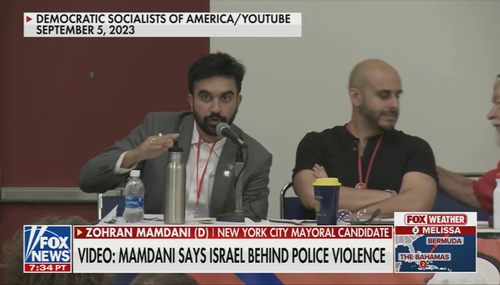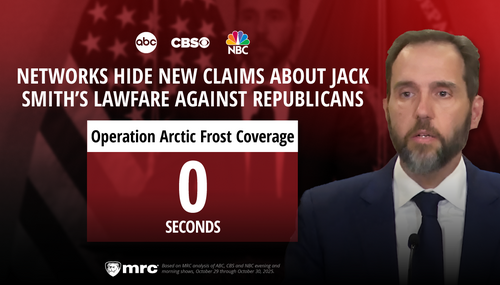 President Obama constantly told falsehoods to the American people about how his policies worked, how they would be implemented, and what the benefits were. His most famous one, “if you like your health care plan, you can keep it” got him the Lie of the Year. But when President Trump does his own spinning, it all of a sudden becomes a moral conundrum for the liberal media. The stacked anti-Trump panel on NBC’s Meet the Press proved this point on Sunday when they debated when to call him a liar.
President Obama constantly told falsehoods to the American people about how his policies worked, how they would be implemented, and what the benefits were. His most famous one, “if you like your health care plan, you can keep it” got him the Lie of the Year. But when President Trump does his own spinning, it all of a sudden becomes a moral conundrum for the liberal media. The stacked anti-Trump panel on NBC’s Meet the Press proved this point on Sunday when they debated when to call him a liar.
Moderator Chuck Todd actually set aside time in the program so he and his stacked panel could go over recent statements by the President and rake him over the coals. “You have to be a sort of taxonomist of falsehoods. I mean, traditionally, the President’s stock and trade has been to traffic in a substance that's identical to my initials,” declared New York Times columnist and faux conservative Bret Stephens.
Having found great amusement in the low-brow joke, Todd reminded viewers that Stephens’ initials were B.S. The columnist then appeared to push the CNN-backed conspiracy theory that something was wrong with the President’s head. “And there's always a question also about the President's state of mind because he says stuff and then often doesn't seem to remember what he had said the day, the hour, the minute before,” he suggested.
Todd thought it was a “fair point” and “funny” that Stephens would question the President’s “mental capacity” even though neither had training in the field. He then promoted the ramblings of “conservative” columnist Andrew Sullivan you “went there”:
This is what he wrote, Helen: “If someone behaved like this in my actual life, if someone kept insisting that the sea was red and the sky was green, I’d assume they were a few sandwiches short of a picnic. It's vital to remember this every day: Almost no one else in public life is no openly living in his own disturbed world.”
“What do you want me to do,” laughed New York Times Pentagon correspondent Helene Cooper as she went on the explain The Times’ policy on using the word “lie.” “And we have said lied in the past but what Dean Baquet, the executive editor of The Times, has said is that he thinks we shouldn't use it all the time because if you use it all the tie it loses the meaning.”
According to Cooper, she couldn’t remember ever “wrestling” with whether or not to use the term. “[I]t's something, I’m not used to having to deal with as a reporter when you’re talking about the president,” she lamented. Todd sympathized with her and described the Trump-era as “disorientating.”
“This is a different level. And I think what we struggle with as reporters, is what do you label a lie? Because a lie has to be deliberate,” said NBC national reporter Carol Lee. “So President with Trump, you know, in order to call it a lie, you have to be able to show that he is deliberately and intentionally doing that. A lot of times when he's ill-informed, he’s misinformed and you don't know what his intent is.”
Republican strategist and former head of the American Conservative Union, Al Cardenas claimed there were only two reasons for why the President would twist the truth, one of them being that he had a mental problem.
Todd also though Cardenas made some great points and huffed about how Obama was “punished” by receiving the Lie of the Year label by PolitiFact. “He didn't serially do it [like Trump]. So here he is punished for one, in a way uniquely.” But claiming Obama was “uniquely” slapped with Lie of the Year was in itself a falsehood because Trump also got that label in 2017.
The transcript is below, click "expand" to read:
NBC
Meet the Press
June 17, 2018
10:58:17 AM Eastern [4 minutes 20 seconds](…)
BRET STEPHENS: You have to be a sort of taxonomist of falsehoods. I mean, traditionally, the President’s stock and trade has been to traffic in a substance that's identical to my initials. And that this is a world
CHUCK TODD: Your name again is Bret Stephens.
STEPHENS: Right.
TODD: Okay, I just wanted to clarify.
STEPHENS: I mean, this is a world sort of -- the gray world between clear truths and unmistakable lies. And there's always a question also about the President's state of mind because he says stuff and then often doesn't seem to remember what he had said the day, the hour, the minute before. I still think that you have to hold the President clearly accountable when he is contradicting information that he has previously pervaded. And that is what we call a lie, not a falsehood.
TODD: Fair point. It's funny you say this about his mental capacity. Andrew Sullivan went there. This is what he wrote, Helene: “If someone behaved like this in my actual life, if someone kept insisting that the sea was red and the sky was green, I’d assume they were a few sandwiches short of a picnic. It's vital to remember this every day: Almost no one else in public life is no openly living in his own disturbed world.”
HELENE COOPER: What do you want me to do? [Laughter] That's like -- it's something that at The Times we’ve been wrestling with on the news side because we get a lot of letters from readers saying, “why don't you say the President made misstatements—“
TODD: Getting a lot of tweets right now.
COOPER: -- why don’t you just call a lie a lie?” And we have said lied in the past but what Dean Baquet, the executive editor of The Times has said is that, he thinks we shouldn't use it all the time because if you use it all the tie it loses the meaning. This is something that not-- I can't remember as a reporter wrestling with -- if you keep saying and he's right to a certain extent if you keep saying lie, lie, lie, it does lose the impact when there’s a real whopper. But it's something, I’m not used to having to deal with as a reporter when you’re talking about the president.
TODD: It’s disorientating.
CAROL LEE: That's the thing. All politicians tell lies. We have experienced this in covering politicians.
TODD: But there used to be honor among thieves.
LEE: This is a different level. And I think what we struggle with as reporters, is what do you label a lie? Because a lie has to be deliberate. So President with Trump, you know, in order to call it a lie, you have to be able to show that he is deliberately and intentionally doing that. A lot of times when he's ill-informed, he’s misinformed and you don't know what his intent is. And so, that adds a whole other dimension that’s we’re not used to. But his false statements -- there's nothing to compare it with. The number of times.
AL CARDENAS: After watching what you just played out here, you only reach one of two conclusions. Does he have, you know, mental capability issues or he is chronically doing this and if he's doing it chronically is it purposeful? Or, you know, just a matter of habit or addiction?
[Crosstalk]
TODD: It does feel like he's selling a timeshare all the time.
CARDENAS: Here's the point. The point politically is that it’s less damaging for him to lie 18 times in one morning than once. Because that feature that helps him the most is the numbness because of the frequency and volume of these things. The numbness with the electorate. They have so much to absorb and so little time to do it that they go home half of the time confused rather than convinced that something is amiss here.
TODD: What a great point. You know, Barack Obama got the quote lie of the year, if you like your health care plan, you get to keep it. I think that was back in 2012 or 2013 or whenever it was. But you're right. He didn't serially do it. So here he is punished for one, in a way uniquely. Bret.
STEPHENS: Sure.
TODD: The numbness.
STEPHENS: The lies sort of disappear in their own ubiquity. But it's important –
TODD: That’s right out of the Putin playbook, by the way.
STEPHENS: Right, it's important for us in the media, I think, to pick our spots. I remember Senator McCain at one point said, “I can't be the car alarm that's always going off.” And I think we also have to be careful about -- for our own credibility about being very scrupulous of separating what are clear lies or seem to be clear lies from misstatements, falsehoods. Otherwise, it gives him the opening to call us the fake news media which is what he wants.




